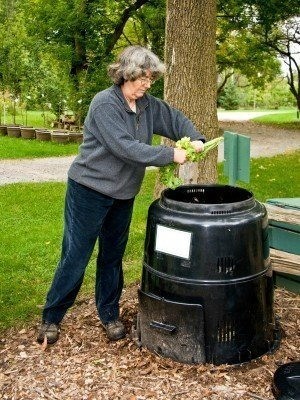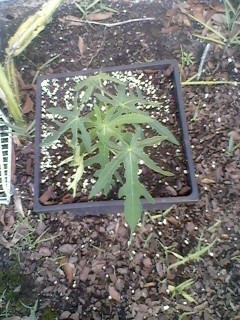 Do not throw out your tea bags with the trash. Save them in a dish and then empty them around your garden plants and shrubs. Makes a good substitute for peat and will add plant goodness and save you cash.
Do not throw out your tea bags with the trash. Save them in a dish and then empty them around your garden plants and shrubs. Makes a good substitute for peat and will add plant goodness and save you cash.
By alan julier from Cradley UK
This page contains the following solutions.
The benefits of composting are many, such as free vegetables, healthy flowers, and the joy of knowing you are removing garbage from landfills.
I have a bucket in my kitchen next to the trash can, I call it my slop bucket. In it we rinse out food containers and cans, put in leftovers we don't end up eating, rinds, peels, sweeping the floor it goes in, vacuum bag, and hair cuttings.
I garden on what some people consider to be a large scale (to me it isn't). I also compost, I have been doing it for over 40 years.
To enrich my compost, I save my peels as I'm cooking. I blend them till smooth and I stir them into the dirt of my compost pile. It reduces garbage and enriches my compost pile.
Once in a while, we forget to eat a certain fruit or the fruit becomes moldy. Instead of tossing the fruit in the trash, you could cut the fruit into pieces and feed to your fruit trees.
I put eggshells in a tray at the bottom of the oven. They get baked and brittle every time you use the oven. Just keep adding to the tray until it is full.
Every fall, we see people working very hard with leaves, putting them in paper bags for city collection. Anyone who has even a modest back yard can use an easier method.
Many garden tools are designed to make the job faster and easier, but an alternative usually exists that can accomplish the same task for a lot less money. Here's a rundown of six handy composting tools - what they do, why they are helpful, and the cost-saving alternatives.
Composting is a great way to get amazing soil for your garden and keep some trash out of the landfill.
Looking for advice on starting a compost? Here are some tips from the ThriftyFun community. Most people avoid meat and meat by-products because of the smell and the tendencies to attract flies which do nothing to help the compost process.
Composting makes great fertilizer for my garden and reduces waste. I have tried a number of ways to avoid walking to compost pile every time I have compostable kitchen waste, veggies, fruit, paper napkins, plates, etc.
For a quick compost container, an old garbage can with the bottom cut out will do the trick. Just toss in fruit peels, vegetable scraps and the like, and pop on the lid.
A good way to enrich your garden soil and help out the earth is to bury your "wet" garbage. I bury my apple, orange, potato peels, etc. in my garden. We can't have a compost heap, but I've found this works just as well.
Since dryer lint is mostly organic material, it is great for the compost pile.
Add flat cola to your compost pile. It seems to "richen" up the compost. I read this on some gardening site.
Do not throw away your daily coffee grounds or tea from tea bags. Mulch or compost them.
I use plastic 4 gallon buckets with lids to store my compost in by my back door. When they are full, I take them to the compost pile and dump them.
Raked-up leaves make great compost and are good to dig into your garden now to enrich the soil for next year's crops.
Here are the questions asked by community members. Read on to see the answers provided by the ThriftyFun community.
I see many references at various compost related info sites, where I often see, "no meat or animal products", but rarely an explanation as to why. Finally saw one response in your site, "because it gets smelly".
Is that the only reason? I thought maybe it might have something to do with such products (meat and meat products) cultivating an undesirable bacteria or something like that. Can anyone enlighten me on this?
By Annuity - Victor from San Francisco, CA
Such products also draw unwanted critters to paw through your compost pile, such as skunks, opossums, and rats.
The meat also contaminates the soil with e-coli germs and other really bad bacterias. This gets into your vegetables or fruit and makes you very sick. Just stick to vegan scraps and a little bit of lawnmower cuttings and you will have a good compost pile.
Rats! Trust me, you do not want an infestation of rats! So no meat or meat byproducts.
I don't put any meat products in my compost AT ALL and still have a very fat mouse living there! I guess he/she likes lettuce and carrots!
What I learned was that in order to compost meat you need a compost pile to reach really high heats. Since a home compost pile usually can't reach the high heats of commercial pile can, it is not safe to compost meat.
The only reason I know of is Parasites and e-coli. And trust me, you don't want them!
It's because it attracts animals, not because it foments especially bad bacteria. We always composted all household garbage except poultry by the "sheet method". Rotating the spot every year, we'd simply spread the garbage over the ground and leave it. Next spring, we'd till it under. We would use any poultry carcasses to feed the crabs in the salt-water creek nearby, ensuring a good harvest of those as well.
We were out in the country with plenty of dogs around so the wild animals didn't bother the composting area, but the dogs sure liked a good roll. After which, someone would be detailed to take the dogs onto the dock and throw them overboard. Wait for them to swim ashore, catch and repeat a few times, LOL. Got the dogs clean, but scared the crabs away for a day or so each time. Using this composting method, our gardens (on a site which had been used for gardening since the 1600's) have always been amazingly fertile, not needing much amendment except lime, occasionally.
On the other hand, now that I live in a town with neighbors close by, I compost in a bin and discard all animal products in the trash.
I compost my kitchen scraps, grass cutting, and leaves in pots. I don't have room for composting bins or a space in the ground. It works fine, I have tons of worms and the kitchen scraps are devoured very quickly. I was attending a gardening class at one of our local nurseries and we got on the subject of using compost. The person leading the class said not to use compost in pots, as it is too high in nitrogen and will burn the plants.
I generally mix the compost with soil and have had good luck with growing my vegetables in pots, but wondered if I should be concerned? I am trying to not have to buy potting soil and was hoping that by mixing the compost with my regular dirt I could create a healthy soil for my container plants. Am I causing more damage to the plants and good? Please help.
Hardiness Zone: 10b
By Janice from CA
I am very new at gardening. I am growing tomatoes, papaya, corn, peas, peppers, etc. I have started collecting all the the peelings from my fruits and vegetables in jars.
How long do I have to wait to mix it into my soil to add to my potted plants?

I really should have asked the question before now, but this is the question or problem. I started to make compost for my organic garden, I used carrot shavings, potato peels, apple cores, banana peels, and whatever veggie scraps I had at the time. I threw in some dirt and a little water and made sure I stirred it up.
Now here is the problem, its been raining and more water got inside the little bucket of compost. The mixture has turned into mud and with the extra water it smells bad almost like someone took a dunk in it, but I thinks its the potato peels that stink. I still see part of the apple core, it's black.
My question is: Can I still use the bucket of mud as compost. Should I drain the water out of it. Or should I put more dirt in it, or just dump it in the garden. What should I do?
By Angie
How can you get a very large pile of grass and horse manure to break down quickly?
Hardiness Zone: 4b
By Margaret from Omaha, NE
Keep it wet, for more info go to-how to compost, good luck.
Turn it several time a week and keep it moist but not dripping.
It takes oxygen as well as water to get the compost bacteria multiplying quickly. You'll know it is finished when it no longer is as hot when you turn it.
If your grass clippings were green and not dry, this pile is going to be very high in nitrogen sources and lacking in carbon sources. Do you have any fallen leaves, shredded newspaper, wood chips, or other low-nitrogen waste you can add to it? High nitrogen piles tend to be more smelly, if I remember correctly.
How do I compost eggshells properly so I don't add any disease to my soil? I am new to composting. I do not have organic eggshells to compost. I've read about so many eggs having disease.
If I hardboiled eggs, then I put the eggshells in the compost because the eggshells have been boiled. However, many times I use eggs out of the shells, so I have been washing the eggshells in the dishwater and rinsing them clean after I am done doing the dishes.
What is the appropriate way to handle eggshells for compost use?
By Carol Rodriguez from South Bend, IN
Are the balls good to put in my compost pile?
By Bill
Is it OK to have a composting box next to a vegetable garden? I'm having problems with insects eating my spinach and chard. I'm thinking that they are coming from the composting box.
By Ian
Check out these photos.
I'm reminded of a joke Redd Foxx told. He said two maids were discussing their employers' garbage. One said, 'You wouldn't believe the good stuff they throw away'. The other said, 'Yes, I would. I bring home all my boss's grape skins. I don't put 'em in their garbage'.